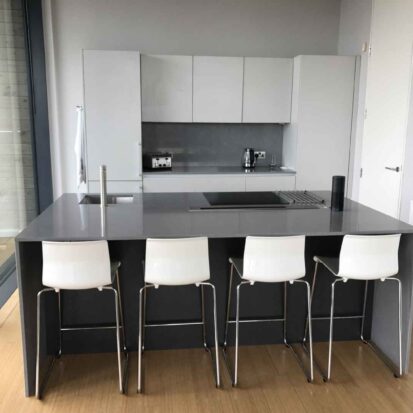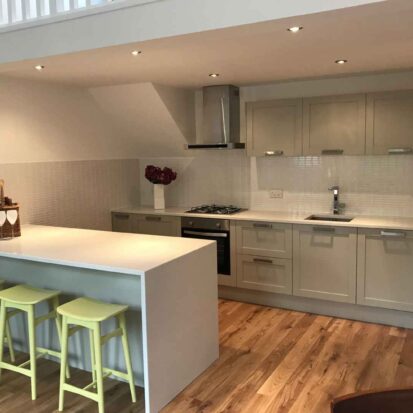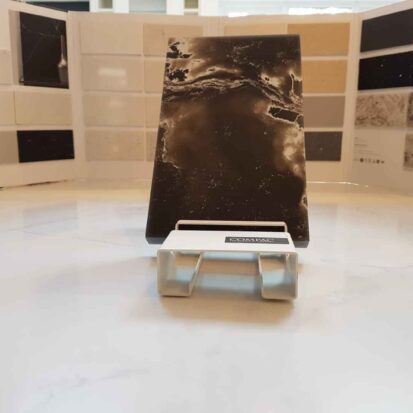How is quartz made? And why are quartz worktops easier to clean than other surfaces?
Quartz worktops are famed for their maintenance-free qualities. Their sleek, stone-like characteristic makes them basically repellent to greasy stains, smudges or dirt. That’s predominantly because nothing gets easily stuck to the surface – even if left over night. Any liquids or solids that fall on quartz do not fuse with it, making it seem as though quartz is coated with teflon.
The truth is, quartz is a man-made product – and some of the main ingredients of the material are composed of non-stick raw materials. The high gloss and the impenetrable, waterproof coating also contribute to quartz’s fantastic easy-clean properties.
Before we discuss further the attributes of quartz, let’s analyse how they’re made and what processes make them such easy-to-clean worktop products:
How are quartz worktops manufactured? Is it a complicated process?
Quartz worktops are a result of an amalgamation of different elements that are compressed and fused together in special environments. From resin to minerals, ground natural quartz and vast pigments (depending the colour in mind), quartz suppliers like Silestone or Compac use complex machinery to create these ‘synthetic’ slabs of stone.
Quartz slabs begin their life in the planning room. Various designers meet together and discuss current colour trends, then browse a catalogue of potential colours that could be released. It’s no different circumstance than the fashion industry, where professional designers amass to participate in discussions regarding new releases, potential products and general concepts. After all, the interior design industry is also constantly changing. There are new styles of kitchen cabinets, flooring, décor and overall appearance. Things that were popular 15 years ago are no longer – the fashion, and therefore the consumer-demand is constantly evolving. With that big quartz brands also need to develop, and they do – on average twenty new products are brought out every two years by quartz companies.
Only ten years ago there wen’t quartzes imitating the natural marble themes like Carrara or Calacatta. Now, every quartz supplier has at least four marble-lookalike quartz slabs among their product collection.
From the planning room, the designs take roughly one year to be ready for physical development. The machinery, the logistics and of course the composition of the stones are constantly consulted, until permission is given to develop a certain product.
Once the resin-pigment-quartz mixture arrives at the factory, it is subjected to extreme heat and pressure, which after merely hours forms giant thick slabs that are then sliced into thin sheets, usually measuring either 2cm or 3cm – depending on the colour.
Interestingly, the process of making man-made quartz is not too dissimilar to creation of true, organic granite. That natural stone is also formed as a result of molten rock cooling under immense amount of pressure. The main difference is that production of quartz is done under a controlled, machinery-equipped environment, while the igneous rock – known by us as granite – is a product of natural circumstances. Not to mention the granite-formation process usually takes far longer than measly hours.
As such, quartz worktops are made through a synthetic process that is a response to current trends and fashion. While it may last hours to actually make a slab of quartz, it takes a long time and a lot of brains & manpower to turn mere concepts into reality i.e. slabs that are then sold individually to you, the customer.
The manufacturing of the slabs is long, tialled and somewhat compilated process – but it’s justified in the price that is then labelled on the stone. Compared to wooden or laminate worktops, which are essentially pieces of wood cut into shape of worktops, it takes a lot more ingenuity, fastidiousness and engineering to create quartz worktops. Materials like ground quartz or resin are also a lot more expensive than wood. This is therefore predominant answer to the question: ‘Why quartz worktops cost so much?’.
Why are quartz worktops clean surfaces. How do they maintain and retain antibacterial properties?
Quartz is currently at the forefront of interior design solutions. Designers, architects and ordinary consumers choose quartz worktops for personal comfort, functionality, and peace of mind that their kitchen surfaces will be long-lasting, resistant, modern and above all beautiful. But many don’t actually realise that quartz worktops are also a fantastic hygienic addition to your kitchen. What do we mean by that?
Let’s examine the quartz properties below, and determine why quartz worktops are the best current solution when it comes to hygiene, cleanliness and our daily health.
Kitchen worktops and the importance of easy, quick maintenance
An average human will spend at least 20% of their daily time in the kitchen. Whether it be to make a morning sandwich, pour some cereal, cook some dinner or prepare the supper.
At the weekend, when we are usually home, carrying out various chores, this can extend to up to 40% – this means we spend hours at a time in one interior. In that time, when we cook, do the washing up or clean the counter-space, we want to make sure that our work is efficient, and cleaning effort is easy and maximised.
Let’s honestly ask ourselves – do we always put a 100% effort into cleaning?
- We rush with our cooking to get the dinner ready for 6pm,
- We quickly chop-up the washed veg – the tomato squirts some of its juice down the chopping board, a bit leaks onto the worktop,
- We throw it in the wok – the oil gushes and sprinkles tiny droplets over the hob,
- We boil some water in the kettle, pour it into a pan – the water bounces off the edges and spurts over our splashback and the worktop,
- The rice comes to a finish, but not before the gurgling water leaps out onto the worktop,
- We fill our glasses with wine, but some of it manages to escape and trickle down the bottle and onto the worktop,
- We finish the cooking, dish out, the family has eaten,
- By that point at least an hour has passed, and now comes the cleaning process.
It’s unlikely that with such regular, daily busy schedule we’ll have the time or effort to give our kitchen a complete makeover. This deep-clean disinfection process happens maybe one, two times a week at most, but usually, when we come back home after a long shift at work, and take another hour on cooking and eating, we rarely have the mental/physical capacity to scour the surfaces down to the tiniest stain or crumb.
That might not seem tragic, but when your kitchen worktops are composed of wood, metal or laminated surface, over time such imperfection will take their toll on your kitchen surfaces.
That tiny speckle of tomato sauce may discolour your wood in a single night, the regular staining around the sink may in a soon transform into warping, after two-three years a crack – eventually the worktops will deteriorate until they’re rendered useless or very unhygenic / difficult to clean.
Quartz is the solution!
All quartz materials produced by renowned European manufacturers (e.g. Compac Quartz, Fugen Quartz, Silestone Cosentino Quartz, Unistone Quartz, B-Stone Quartz, Technistone Quartz, Cimstone Quartz etc.) are inherently non-porous in nature, meaning nothing can penetrate them. They are imbued with with the most advanced chemical properties – the concoction of resin, quartz and vast other agents means they are essentially always coated with a hydrophobic layer. Therefore cleaning usually ends at a single swipe of the cloth.
You can even lay off that coffee stain, wine splodge or sauce smear for days, even weeks at a time, and still one graze with a damp cloth along the quartz worktops will completely eliminate blemishes or contamination. The aforementioned companies have spent years perfecting their quartz products, and countless hours have been invested into rough, rigorous and dedicated testing of quartz worktops. Finally this resulted in manufacture of a near-flawless material.
So, if you still own laminated, metal or wooden worktops, make sure you switch to quartz ASAP, to save yourself countless hours in cleaning, frequent headaches or anxiety that you’ll damage the worktops.
That’s right, forget about stressing over staining, de-colouring or damaging your kitchen worktops. Nothing can affect quartz worktops negatively, meaning you can put your mind at ease and if you’re tired, neglect cleaning without suffering the consequences. Even if you leave your kitchen dirty or at a non-pristine level, your worktops won’t suffer. Not to mention you’ll be saving yourself priceless hours on cleaning. Many of our past customers who formerly owned wooden, metal or laminated worktops complained about the neverending scrubbing / polishing just to get stains off or attempts at digging out all the grime from the tiny scratches, or drying the worktops helplessly to ensure no droplets are absorbed by the worktops.
Quartz kitchen worktops are engineered in a way to make your life easier, in the long term saving you money – not only on cleaning products but on future investments in repairs/substitutions of worktops. If you own quartz worktops, you won’t be needing any other worktops for a decade or two. These modern kitchen worktops retain their qualities and brand new look for years, and no liquid, acid or time will fade their attributes.
Many architects, designers, home-planners or investors agree on one thing: quartz worktops are truly ideal products for kitchens or interior design.
Non-Porosity is the key to healthier life in the kitchen
All quartzes are non-porous, designed in such way that no liquid can penetrate the surface. As we mentioned above, the composition of many quartzes is a fusion of resin, pigments, quartz particles any many other additives that repel all liquids, keeping your quartz worktops safe and stain-free.
This quality is unique and certainly makes your daily job easier and more efficient. If water gets absorbed into wooden or laminate worktops, which it often does, the worktops will expand, rot or warp over time. Therefore with wooden or laminate worktops one needs to be very careful and preferably clean up instantly after liquid has been spilled. This can make us anxious and render cooking or cleaning – especially when we’re fatigued – very stressful lest we cause damage or discolouration to our surfaces.
The same could go for metal worktops – even though these don’t absorb water, if enough liquid accumulates over time, and we neglect the cleaning, it can generate rust on the worktops, which can be very bad for our health. Quartz worktops, on the other hand are resistant to all kinds of liquids, even the heavy, acidic ones like lime juice, coffee, wine or sauce.
But we haven’t yet mentioned the most important aspect – non-porosity offered by quartz worktops successfully counters bacteria, preventing it from sinking in.
Resistance to damage = Resistance to bacteria, grime and germs
Wood worktops, laminate worktops and even metal worktops have one primary flaw in common – they’re susceptible to damage. And this can really spoil your levels of cleanliness.
- Take a hefty slice out of your bread on your wooden worktops and you’re going to be left with scratches and cut-marks that are essentially non-repairable.
- Expose your plastic or conglomerate worktops to a boiling pan and they will melt or charr with black stains that will be near impossible to remove. The same goes for sharp objects that will easily leave cut marks on the surface.
- Drop a mug on your laminate worktops and you’ll be left with chips and indentations.
- Slide your cutlery or other metal objects across the surface of your metal worktops and you’re going to generate minute scratches that may be invisible to the naked-eye.
For these three, and many other worktop varieties, damage is simply inevitable. Even if you’re careful you won’t be able to avoid the scarring or defilement, especially on the nanoscopic level. Should you have these kitchen worktops for 2-5 years, they will be riddled with imperfections.
It all matters, because bacteria loves to settle in these tiny nooks, and even when using cloth, soap and antibacterial wipes, detergents, antiseptics, antibacterial sprays, gels or cleaning products, you will never remove all of the lingering grime. The solution here is to implement kitchen worktops that can resist all kinds of damage, especially the vulnerability to porosity.
It’s simple – if liquid can’t penetrate the surface of the worktop, and impacts or abrasion don’t yield any damage to the worktop, 99% of the bacteria will be annihilated with a single swipe of the cloth and accumulation of grime in the microscopic grooves and crevices will cease to happen.
Opting for quartz kitchen worktops is the answer:
- Quartz does not scratch when objects glide along its surface. In fact, even bladed, sharp items such as knives don’t leave a mark on the quartz kitchen worktops. Many people don’t even bother with purchasing chopping boards because of quartz’s durability. This is yet another fantastic quality of quartz worktops,
- Quartz does not chip when simple household objects drop on the surface (of course if you hammer it, it will chip eventually – it’s not indestructible),
- Quartz worktops don’t crack under pressure. You can even stand on quartz kitchen worktops, lean against them, pile dishes on top and it will never split (of course under condition that it has enough cabinet support – if you remove 1 cabinet, and decide to stand on the worktop in the weak spot, it may crack – but even then it’s unlikely).
- As we’ve already mentioned above, the anti-porous nature is the biggest attribute of quartz worktops. That means it ages very well and doesn’t damage over time. Not only does this prevent grime and bacteria from collecting in the minute fissures, it also hinders liquid from expanding and cracking the worktop, as is often the case with wooden or laminate worktops. And the bigger cracks or under-layer warping, the bigger the chance of bacteria, grime or food particles gathering in these places. If this issue becomes prevalent, even making a sandwich directly on the worktop or cooking something will become off-putting and even harmful to our health.
With quartz worktops, you can forget the aforementioned issues. You need to remember – unless a lot of unnecessary, malicious power is used to purposefully try and damage quartz worktops, they will last you for a lifetime. It’s truly a product that few other kitchen worktops manufacturers can match.
Indeed it’s a tad more pricey than kitchen wood or laminate, but you’re essentially investing in a material that is near-indestructible, hygenic, sterile, simple to maintain and above all lasts a lifetime.
Are there suppliers of quartz worktops that specialise in antibacterial properties?
Of course. If you’re searching for something even more unique i.e. kitchen worktop products that are outright antibacterial, your eyes should be drawn by the likes of Silestone, Cosentino. The materials produced by Silestone are enriched with antibiotic agents like triclosan that heighten the quartz worktops resistance to bacteria, not only preventing bacteria absorption like with all other quartzes, but outright repelling it. For more information visit: Silestone Quartz Surfaces.
Where are Silestone’s antibacterial worktop products best suited?
- In terms of application, these hygienic worktops are fantastic for professional restaurants where cooking and cleaning is ongoing on a daily basis. You not only guarantee yourself a more sterile cleanliness level, but you also prevent damage of the kitchen worktops – just think how many pots and pans scrape these surfaces daily. Many also argue that a professional cooking environment can benefit thanks to quartz worktops because it makes the cooking more efficient. Like we mentioned above, sometimes even chopping boards can get discarded and chefs can cut, slice and dice away instantly on the quartz worktops. Each kitchen station has their own method, but we can’t deny that quartz just makes cooking so much more simple – especially during the clean-down.
- Another great application for quartz could be hospitals. As you may know, hospitals have a steadfast rule that cleanliness and a sanitation are a priority. And don’t be mistaken, quartz can be applied in different ways – kitchen worktops aren’t the only solution. You can clad the floors with quartz, as well as the walls, patient rooms, operation tables etc. Quartz worktops can even come in an anti-slipping matte finish. The point is, quartz in hospitals would be yet another precaution and measure of keeping the place safe, hygienic and sanitary.
- Kitchens for those who love a perfect, neat, and disinfected home. Those who get frequently anxious about germs collecting in their kitchens, suffer from OCD or simply love that perfect look should opt for quartz worktops. Quartz worktops are guaranteed to make your kitchen far more germ-free than if you had any other worktop surface. So why not opt for this product, sleep safe at night and guarantee yourself a greater standard of cleanliness?
Don’t hesitate and order some quartz worktops for your place! It will be an unparalleled investment you won’t regret.
The later you delay it, the more likely that bacteria, germs and grime will be growing on your kitchen worktops, and the more hours you’ll have to dedicate on cleaning, and worrying if you’ve done enough. With quartz worktops all this anxiety, time-wasting and money spending will be gone.
Get in touch with Polish Granite and order your quartz worktops today. We have hundreds of colours available, a quick installation service, 1-day wait free quote policy. But most of all, we can provide you an unfailing, reliable product that will serve you for a lifetime.
To find out more about our quartz worktops visit our main quartz worktops page here.



